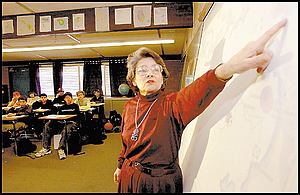

January 6, 2003
Boulder Daily Camera
by Amy Bounds and Elisabeth Nardi

Ingrid Fotino uses an overhead projector while telling the story of her family's escape from Romania in the late 1940s to Kyle Walpole's eighth-grade geography class at Summit Middle School last month.
Photo by Mark Leffingwell
Summit Middle School math teacher Ingrid Fotino takes a break once a year from teaching calculations and turns her attention to history.
She has a personal story to share with students: When she was just 8, her family undertook a harrowing journey out of Soviet-occupied Romania at the end of World War II.
She tells her story to history classes to give students a firsthand account of the facts they read about in textbooks. She also wants to contradict what she sees as a cover-up of atrocities by the Soviet Union.
"So little is known or understood," she said. "The Soviets killed so many people."
As she talked to teacher Kyle Walpole's geography classes this year, she asked students to imagine waking up one morning to find the streets of Boulder crawling with tanks, and soldiers speaking a foreign language forcing them out of their homes.
To help illustrate her story, she showed the students a video of a river her family crossed, and pictures of the place she was held prisoner and the way Romania looked the day after the Soviet Union invaded. Maps gave the students a feel for the countries her family traveled through.
While fleeing Romania by boat across the Danube River, her family was captured and held in a Yugoslavian prison.
She said a cup of coffee, a bowl of barley or pea soup and a sliver of bread was all they were given to eat each day. After two years in prison, her family was moved to a farm in southern Yugoslavia.
"We could see the Greek mountains, and we could almost touch them," she told the students. "We could almost touch freedom."
But she said they were told that if they left the farm they would be shot.
She doesn't flinch from telling students about the most traumatic part of her experience — learning that a 15-year-old friend and the friend's 17-year-old brother were killed trying to get to Greece.
"They took them and they shot them," she said.
Her family narrowly escaped the same fate, she said.
She said soldiers began allowing small groups to leave the farm and make their way to Greece. The first group, which included her friends, was taken to the border of Greece and told to go down a hill and into a valley to enter that country.
But she said her family learned that the group was shot in the valley as a warning to Yugoslavian peasants considering fleeing to Greece.
When her family's turn came, she said they ignored the escort's instructions to go into the valley and instead went a different direction, making it safely to Greece.
She said her family's experience felt like "an amputation."
"When we were in prison, no one knew we were there," she said. "There was no telephone, no mail, no visitors. We were cut off from the world. We did not exist. They could do anything they pleased to you."
While reliving her experiences with students is draining, she said it's worth it to help them gain a better understanding of the atrocities of a time in history that doesn't typically receive much attention.
"People in this country are sheltered from what it means to be occupied," she said. "History can be such an abstract, impersonal thing. I hope to make it more real."
Students listened intently as Fotino described her time in prison and talked about friends who were killed.
"It's amazing that they could cover it up, that they could cover up such torture," said eighth-grader Sam Shapiro.
Classmate Chalie Simon said she was amazed by Fotino's courage.
"It's great that she would tell us about this," Chalie said. "She thinks it's important enough that we know."
Walpole, the history teacher, said Fotino's story adds to students understanding as they study Yugoslavia and the Iron Curtain.
"It makes the students realize in a personal way what happened," Walpole said.
Once free, Fotino said her family couldn't find jobs in either Greece or France, so they came to the United States. Exactly 50 years ago, she arrived in New York. Her family planned to return to Romania, but when nothing changed there they instead made their lives here.
"We started our lives over," Fotino said.
Out of all the bad, Fotino told the students, she also found an extraordinary amount of good in the generosity of others. She said her experiences have made her stronger.
"We can each be like a light by the example we set — and our light will be imitated," she said.
January 24, 2003
Boulder Daily Camera
COMMUNISM
by Brad Littlehales
Boulder
I was pleasantly surprised to read the heroic story of Ingrid Fotino and her family ("Teacher shares imprisonment story," Local News, Jan. 6). Ingrid is correct when she refers to the coverup of Soviet atrocities.
It is important for today's students to know about the 40 to 60 million Europeans that died in the disastrous and barbaric experiment that was communism. Most current textbooks omit this slaughter and imply that communism was just another failed political/economic system.
It must be emphasized that communism is so unnatural to basic human aspirations that it requires oppression and genocide to stay in power. I commend Ingrid and Kyle Walpole for spreading this truth that is often intentionally hidden from today's students by armchair Marxists and Soviet apologists.
We must always remember that even here in our country there were assaults on our freedoms by groups and individuals that were either dupes or conscious agents of communism. Members of my family fought on picket lines to keep their unions free of Marxist subversion in the 1930s and 1940s. We were blessed to come of age in an ethnically diverse, working-class society that had family connections to Eastern Europe and first-hand knowledge of the bloody reality of communism. I was surprised when I went off to college and found that were some, usually from upper-middle-class suburbs, that actually fell for this claptrap.
Congratulations to Ingrid, Kyle and also to Amy Bounds and Elisabeth Nardi of the Daily Camera. This is a subject that deserves more attention in a town that dedicated the center of its campus to Dalton Trumbo, who, to quote Vincent Carroll, editor of the Rocky Mountain News editorial pages, "joined the Communist Party, then a wholly owned subsidiary of the Soviet Union focusing on domestic espionage, after Stalin had already slaughtered a population nearly equal to that of modern-day Texas." (Dec. 21, 2002.)